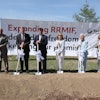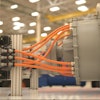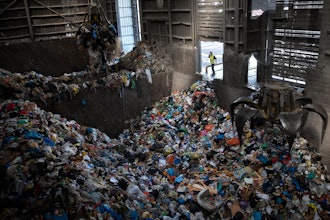NORFOLK, Va. (AP) -- Where workers once assembled Ford pickups, they now will sort, package and ship plastic pellets. Billions of them.
Hampton Roads, meet the nurdle.
Nurdles, which range in size from a BB to a gum ball, come in various shapes and colors.
Produced by petrochemical companies, they are the raw material manufacturers melt down to make just about any plastic product - everything from water bottles to cellphone cases.
The pellets have drawn criticism from environmentalists and the U.S. Environmental Protection Agency because they're sometimes washed into rivers and oceans and are eaten by wildlife.
Belgian logistics company Katoen Natie NV spent $10.5 million on March 18 to purchase a 662,000-square-foot building at the former Ford Motor Co. assembly plant in Norfolk. In, the next few months, it will be transformed into a distribution center for nurdles.
Katoen Natie estimates the Norfolk site could handle 30,000 tons of the pellets a month - enough to fill roughly 333 truck-sized shipping containers. It will employ 225 workers.
The company, which is based in Antwerp, is the world's largest handler of the pellets, said Frank Vingerhoets, president for its North American operations. It employs about 600 workers at five other U.S. sites, including its headquarters in Houston.
Katoen Natie began scouting Hampton Roads as early as 2004 as a possible distribution site, and had been eyeing the Ford plant since it closed in 2007.
"They came in solely because of their interest in the port facilities," said Russell Held, the Virginia Port Authority's deputy executive director of business development. "This is an industry that has changed over the years. One of the reasons it took so long for this to come about was that the world economy changed, and we saw more of this being exported."
The company hasn't decided whether the Norfolk site will be used to export the pellets or import them, Vingerhoets said.
"For the moment, pellets are mostly made here in the U.S. and shipped overseas," he said. "Norfolk would be good for export and good for import. There's always going to be one or the other."
U.S. exports of plastic resins and products increased 6 percent between 2009 and 2010, while imports grew 10 percent, according to the U.S. International Trade Commission.
Whether it's exporting or importing, Katoen Natie would truck containers of nurdles between the port's terminals and the distribution center. The center also will receive shipments by rail and ship to domestic manufacturers by rail or truck.
"They make them in rail-car quantities," Vingerhoets said. "Those rail cars are shipped to us. We have equipment that takes those pellets out of the rail car and puts them in a box or bag. We can also do the reverse."
The site is served by both Norfolk Southern Railway and CSX Transportation via the Norfolk and Portsmouth Belt Line Railroad.
Katoen Natie is spending $1.5 million to retrofit the plant for handling nurdles.
The company is in talks with its customers to determine which ones want to use the facility, Vingerhoets said.
Plastic pellet producers such as Dow Chemical and ExxonMobile account for about 70 percent of its customers; the rest are brokers, he said.
The logistics company will decide in six months whether to purchase an additional 25 acres at the former automobile plant that could be used to expand the center after an environmental review of the soil at the site.
In addition to more nurdles, that also could mean several hundred more jobs at the site in next few years, Vingerhoets said.
Hampton Roads, meet the nurdle.
Nurdles, which range in size from a BB to a gum ball, come in various shapes and colors.
Produced by petrochemical companies, they are the raw material manufacturers melt down to make just about any plastic product - everything from water bottles to cellphone cases.
The pellets have drawn criticism from environmentalists and the U.S. Environmental Protection Agency because they're sometimes washed into rivers and oceans and are eaten by wildlife.
Belgian logistics company Katoen Natie NV spent $10.5 million on March 18 to purchase a 662,000-square-foot building at the former Ford Motor Co. assembly plant in Norfolk. In, the next few months, it will be transformed into a distribution center for nurdles.
Katoen Natie estimates the Norfolk site could handle 30,000 tons of the pellets a month - enough to fill roughly 333 truck-sized shipping containers. It will employ 225 workers.
The company, which is based in Antwerp, is the world's largest handler of the pellets, said Frank Vingerhoets, president for its North American operations. It employs about 600 workers at five other U.S. sites, including its headquarters in Houston.
Katoen Natie began scouting Hampton Roads as early as 2004 as a possible distribution site, and had been eyeing the Ford plant since it closed in 2007.
"They came in solely because of their interest in the port facilities," said Russell Held, the Virginia Port Authority's deputy executive director of business development. "This is an industry that has changed over the years. One of the reasons it took so long for this to come about was that the world economy changed, and we saw more of this being exported."
The company hasn't decided whether the Norfolk site will be used to export the pellets or import them, Vingerhoets said.
"For the moment, pellets are mostly made here in the U.S. and shipped overseas," he said. "Norfolk would be good for export and good for import. There's always going to be one or the other."
U.S. exports of plastic resins and products increased 6 percent between 2009 and 2010, while imports grew 10 percent, according to the U.S. International Trade Commission.
Whether it's exporting or importing, Katoen Natie would truck containers of nurdles between the port's terminals and the distribution center. The center also will receive shipments by rail and ship to domestic manufacturers by rail or truck.
"They make them in rail-car quantities," Vingerhoets said. "Those rail cars are shipped to us. We have equipment that takes those pellets out of the rail car and puts them in a box or bag. We can also do the reverse."
The site is served by both Norfolk Southern Railway and CSX Transportation via the Norfolk and Portsmouth Belt Line Railroad.
Katoen Natie is spending $1.5 million to retrofit the plant for handling nurdles.
The company is in talks with its customers to determine which ones want to use the facility, Vingerhoets said.
Plastic pellet producers such as Dow Chemical and ExxonMobile account for about 70 percent of its customers; the rest are brokers, he said.
The logistics company will decide in six months whether to purchase an additional 25 acres at the former automobile plant that could be used to expand the center after an environmental review of the soil at the site.
In addition to more nurdles, that also could mean several hundred more jobs at the site in next few years, Vingerhoets said.






















